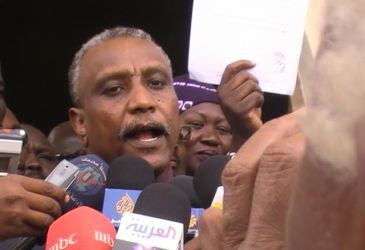Sudan facing two options: change or collapse: Arman
January 13, 2016 (KHARTOUM) – Secretary General of the Sudan People’s Liberation Movement/North (SPLM-N) Yasir Arman said Sudan has reached a point where it has no options but change or collapse.

He stressed the recent riots in Western Darfur state capital of El-Geneina proves that the country is on the verge of collapse, saying the government failed to provide security to its subjects and its security organs has turned into parallel militias.
A security force on Sunday opened fire on hundreds of internally displaced persons who stormed the premises of the West Darfur state government to protest attacks by pro-government militiamen in Moli village located 20 km south of El-Geneina killing 12 people and injuring several others.
Arman further accused the government of making desperate attempts to drive a wedge between the opposition and the Sudanese people.
He dismissed accusations that the SPLM-N is seeking make a unilateral deal with the regime, saying they are fighting the government at various political and military fronts and sacrifice martyrs everyday.
The Sudanese army has been fighting SPLM-N rebels in Blue Nile and South Kordofan since 2011.
Last November the two parties failed to reach cessation of hostilities and humanitarian access agreements, as the five-day talks showed that important gaps persist in the positions of the two sides.
Several government officials have recently hinted that the SPLM-N would join the internal dialogue conference but the latter dismissed those claims as untrue and stressed it would only engage in an equitable and inclusive dialogue to achieve a comprehensive solution for the country’s crises.
SPLM-N Secretary General urged the Sudanese activists to escalate the campaigns against government violations and to make use of the European fears regarding the increasing flows of refugees.
“If Europe fears [from the large influxes of] migrants, the wars in Sudan and the incidents [such as those which took place in] El-Geneina and Al-Abassia will increase the number of migrants to Europe particularly as Sudan has become a generator of [forced] migration”, he said
